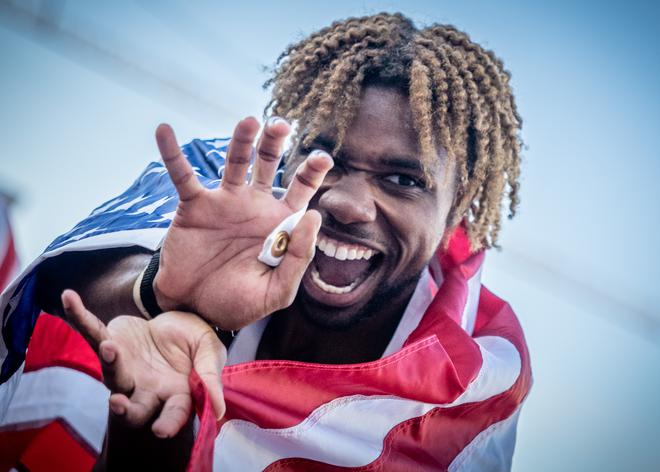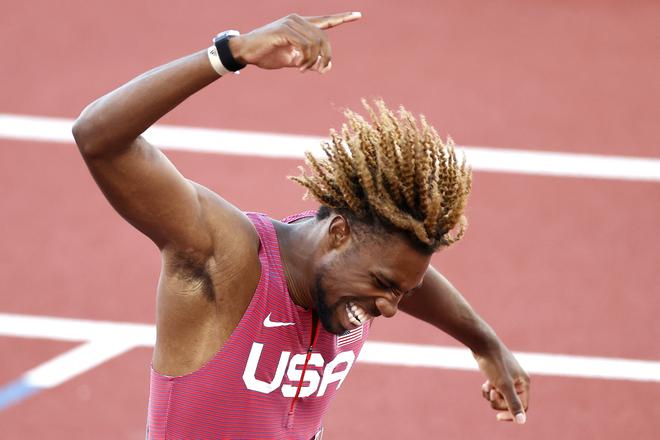

Noah Lyles is one of the most captivating personalities in the world of athletics.
Witty and irreverent, with a fondness for self-deprecatory humour, the American is also comfortable talking himself up in grand pronouncements that would sound boastful if it weren’t for the fact that they tend to be mostly true.
He dabbles in hip hop — he has written numerous songs and fancies himself as a rapper — reads comic books, watches anime movies and builds things with Lego (anything with a “Star Wars” theme). He also has a shopping “habit”, which indulges his love for high-end fashion.
He has no problem being an entertainer. He loves the spotlight, which is good since he’s in it so often. But Lyles isn’t just a smooth-talking showman; he’s a deep thinker who is unafraid to address difficult issues, including racism and depression, in the harsh public glare.
Multifaceted
Lyles, the athlete, is similarly multifaceted. He has a collegial approach to his work off the track — he relishes the camaraderie of the training group — and is warm and generous in his appreciation of his rivals. But on the track, at his best, he is a ruthless, cold-blooded winner.
His talent as a sprinter was apparent from very early, but his hard-nosed competitiveness has come into focus more recently. To be fair, he feels he is at his most effective when he is having fun and “being myself”; from starter’s gun to finish-line, however, his focus is unrelenting.
The narrative arc of Lyles’ career, in public perception, has shifted from being the heir apparent to Usian Bolt to thwarting the new heir apparent to Usain Bolt: the prodigiously talented Erriyon Knighton. Lyles is still a young man, having recently turned 25, but is seen by many as a throne-warmer for his 18-year-old rival.
Lyles, however, is having none of it, and is determined to create a legacy that will compare favourably with the all-time greats. Nowhere was this more evident than at the World Championships in July, when Lyles defended his 200m crown to win his second Major gold in an individual sprint event.
In the top tier
He scorched to victory in 19.31 seconds to become the third-fastest athlete of all time over the distance and break four-time Olympic champion Michael Johnson’s hallowed 26-year-old American record — a mark that, for decades, seemed unapproachable. Knighton could only finish third (19.80); Tokyo runner-up Kenny Bednarek took silver (19.77) for an American 1-2-3.
Lyles’ time is only behind Bolt’s 19.19 (2009) and 19.30 (2008), and Yohan Blake’s 19.26 (2011).
Johnson and those gold shoes that crossed the line in 19.32 at the Atlanta Olympics in 1996 hold a titanic place in track history, too. Johnson ran it 352 days before Lyles was born. The clock initially showed Lyles’ time as 19.32 — causing him to crouch down, put his hands on his knees and glare at it — before eventually correcting to 19.31.
“I was very self-concerned about whether that number was going to turn from a ‘2’ to a ‘1’, I didn’t want to see ‘32’, I didn’t want to share a record,” Lyles said. “Nobody wants to share a record. I think even Michael Johnson doesn’t want to share a record. So I was just begging it to change.”
The record was a glorious addition to what was a supremely successful outing for Lyles, given how determined he was to prove his superiority over his young opponent. Especially after Knighton’s 19.49 earlier in the year, which made him a slight favourite at the Worlds.
But Lyles had beaten Knighton at the US nationals and waved his finger as he crossed — a not-so-subtle message that he wasn’t giving in.
The defeat and its manner prompted the teen to storm off during a televised post-race interview in frustration. “It makes the sport better,” Lyles told reporters. “I know that he’s coming back with a vengeance, and I’m not going to give anything less than I have.”
Knighton’s riposte at the Worlds didn’t challenge Lyles, however. “Everybody put in the work to be great, and that’s what he did,” Knighton said. “I mean, he broke the American record.”
Lyles beat Knighton again in the Diamond League Final this week, proving that he clearly had the measure of the teenager.
The battle within
Although the Lyles-Knighton rivalry is what excites athletics fans, the 25-year-old would be the first to concede that his biggest competition over the past few years has been himself.
Once, he was seen as track’s solution to its Bolt problem — someone to capture eyeballs after the sport’s most outsized personality retired.
But the pandemic hit. Lyles, who considers himself an entertainer at heart, suffered at travelling alone and competing in front of empty seats. He was unflinching about his mental-health struggles and how difficult it was to not be able to race alongside his brother, Josephus, who has since joined the US relay pool.
“The mental health I had in that moment is what makes this moment also great,” Lyles said after his second World title. “Because it shows that you can come through a dark storm and come out of it better.”
Though the time — 19.31 — says it best, the race he ran was, indeed, a beauty. Arms pumping, machine-like, his 5’11” frame — two inches shorter than Johnson and a half foot shorter than Bolt — hugged the inside line of Lane 6 as he rounded the curve. It was over after that. When Lyles hit the straightaway, two body lengths separated him and Bednarek in Lane 5. When Lyles hit the finish line, the gap between him and second place was three full strides.
A hyped-up Lyles had celebrated his 25th birthday by setting the fastest qualifying time of 19.98 seconds in the heats and playfully wagging his finger to the six stragglers behind him. All part of the fun and part of the show delivered by America’s most engaging sprinter.
His profound side was in evidence as well, as he reflected on what the birthday meant to him. “By this time in a Black man’s life, we are either put in jail for life, killed in gang-related events, or killed just for the colour of our skin,” Lyles tweeted. “So when I say glad I made it to 25 I mean it!!!”
Legacy building
The 2024 Olympics offers Lyles an opportunity to burnish his legacy. While he is continuing to run the 100m at a high level from time to time, including very successfully in the 4x100m relay, it’s the 200m that is building his legend. An Olympic gold, to go along with his two World titles, will grant him the sort of respect that is reserved for the best of the best.
A triumphant night in Paris will also lessen the pain of Tokyo. He took bronze and won hearts with the courage with which he spoke on his mental-health issues, but fell short athletically.
Lyles, however, has always marched to the beat of his own drum. He wants to live up to the one word tattooed across his rib cage: ‘Icon’. “They are going to say I’m an icon,” Lyles once confidently proclaimed. He is getting there on his own terms. As he said after his first World Championships gold, “If you want to see me do great things, you have to let me do it the way I have to do it.”







